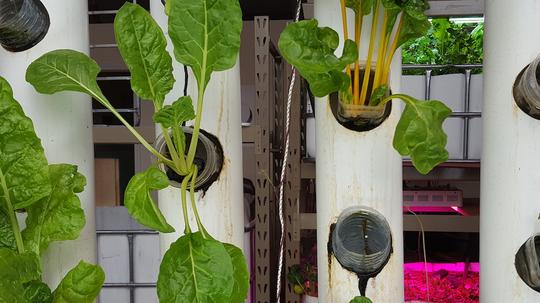
Aquaponics has long fascinated those working in sustainable agriculture. The closed loop system, which uses fish waste to fertilize plants whose roots help purify water that goes back into the tank, could provide a sustainable source of protein (fish) as well as plant nutrients (leafy greens work particularly well with the system). It also uses 90 percent less water than traditional farming.
But many startups, including several in Chicago (most notably FarmedHere, which closed its 90,000-square-foot Bedford Park facility in January), have tried to launch aquaponics ventures and failed. What are these entrepreneurs missing?
Community and data, according to Aqualogue, a recently-launched Ukrainian Village aquaponics nonprofit.
Aqualogue, which has been operating out of a small storefront on Chicago Ave. since October, is a combination aquaponics research hub, education center and community organization. They're researching best methods for growing, creating aquaponics kits suited for homes and classrooms, and will host educational workshops around the city and out of their Chicago Ave. headquarters.
In addition, they're working on an online open resource data hub, called the Aqualogger, that would allow people to closely monitor their aquaponics systems and share best practices with fellow aquaponics enthusiasts around the country. The team just launched a Kickstarter aiming to raise $20,000 to get their kits out to schools and develop Aqualogger.
The founders are passionate about the potential of aquaponics as a sustainable food source and hope to expand the practice through Aqualogue. But unlike some of the for-profit aquaponics ventures that have come and gone, they're looking to scale through getting compact kits in peoples' homes, classrooms and neighborhoods, rather than creating a single, central large-scale aquaponics facility.
"You scale it down and you spread it out," said cofounder Andy Ayer. "For [example] at small batch breweries, it’s quality over quantity."
"With this approach, people get closer to the ground, they get more connected to how their food is grown—it’s a community," he added.
This community-oriented approach is on display in their Chicago Ave. research hub. There's a compact in-home or in-classroom design that uses less than $60 of off-the-shelf materials (from PVC pipes to $.60 goldfish) to grow 10 plants out of plastic water bottles, including swiss chard, arugula and lettuce. There's also a slightly larger system set up with four PVC pipes and tilapia, as well as a much bigger four-tub system that Ayer said had the capacity to grow enough to serve 10 people their leafy greens for a week. The Aqualogue team sees these systems as similar to community garden co-ops—people could sign up to tend to the aquaponics system once or twice per week and take home produce in return.
The Kickstarter funds will go, in part, to providing permanent system installations of their most compact prototype to educators throughout Chicagoland along with course materials on aquaponics, system thinking and horticulture. They have one pilot program set up with Gardeneers, and plan on running three more by the end of the year.
"I've been pretty floored by how much support we've gotten, both from our volunteers but also from places like the Chicago Youth Centers, Gardeneers, Patchwork Farms and elsewhere," said cofounder Susan Lanier over email. "That said...of course, it's not at all surprising that people are concerned about the planet we live on and want to know how to grow their own food and where their food comes from."
Maintaining a thriving aquaponics system also requires close monitoring of metrics within the system, such as water temperature, pH levels, ammonium and nitrate. By the end of the year they hope to sell aquaponics kits with probes to stream analytics via Aqualogger, their open sourced data hub that will allow people to monitor their own system, see live metrics tracking of Aqualogue's systems and share best practices. This will then help “demystify" the science around aquaponics.
Aqualogue was cofounded by Ayer, Lanier and Nicole Pellegrini (they met while campaigning for Bernie Sanders). The organization is run by volunteers that have a range of expertise from a masters in organic agriculture to a former employee of FarmedHere.
Ayer noted that a nonprofit, small-scale approach is "more difficult" in some ways, given they'll have to seek funding and convince individuals to give the new agricultural system a try.
"You’re not going to make profit off it, but the dividends are in trying to solve a greater problem: How are we going to feed 10 billion people in the next 20 years?" he said.








